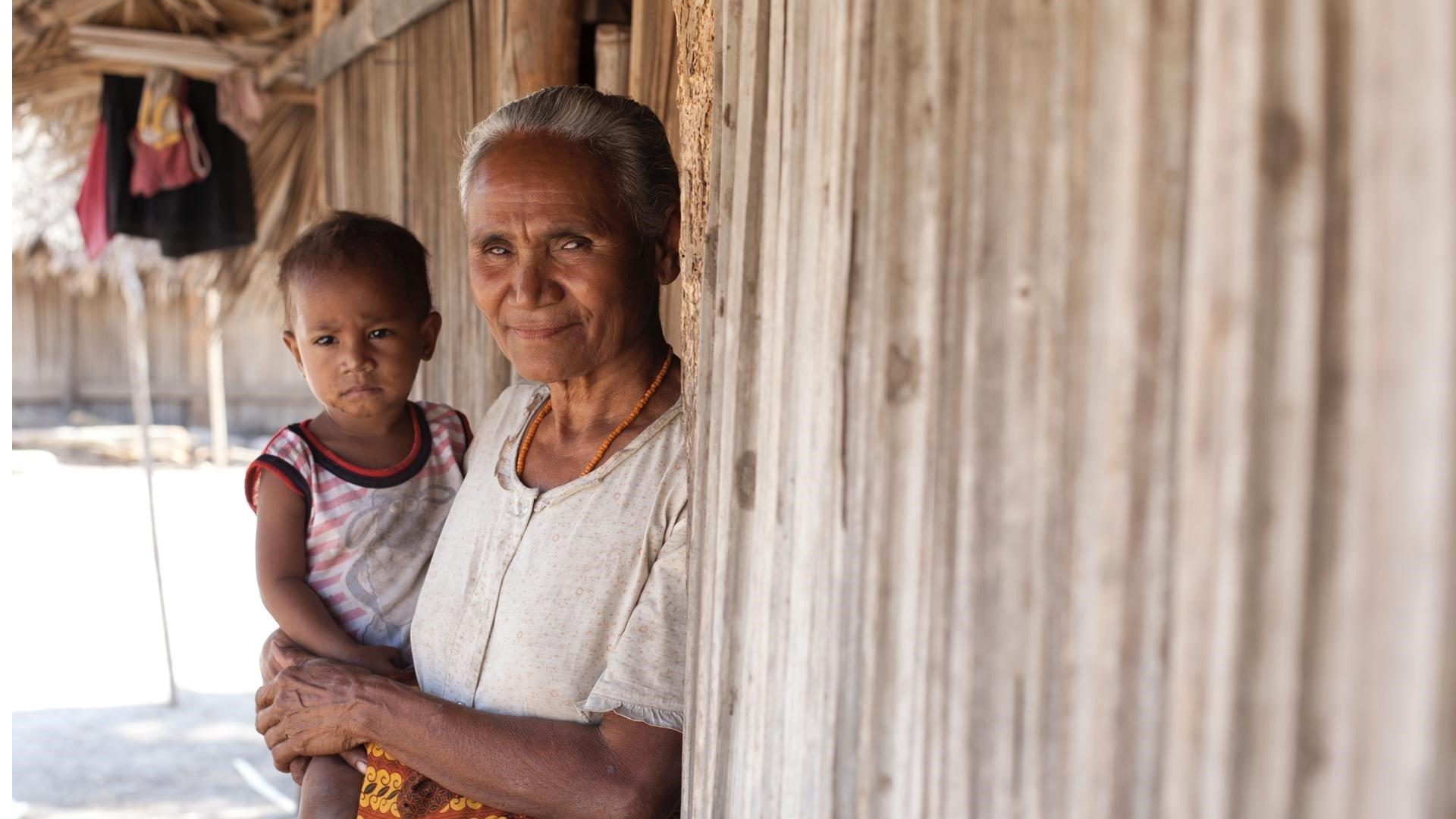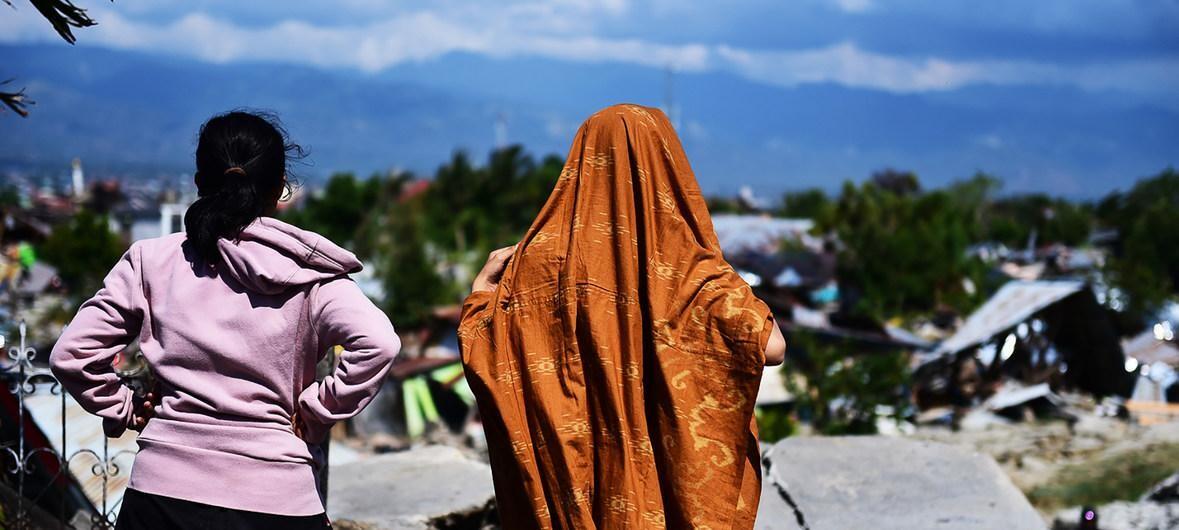Bangkok, Thailand / Central Sulawesi, Indonesia - On 28 September, 2018, a shallow 7.5 magnitude earthquake flattened communities in Central Sulawesi in Indonesia. The earthquake and tsunami it triggered, along with liquefaction of a vast swath of land, left more than 4,340 people dead and over 200,000 displaced from their homes.
“The Sulawesi disaster was devastating on so many levels, but especially for women, children and the elderly.” reflects Bjorn Andersson, Regional Director for UNFPA in Asia and the Pacific. “Whole towns were destroyed, leaving these vulnerable groups even more at risk when the health and sanitation systems broke down. However, from disaster sprang an inspiring response that truly brought everyone together, and underscored the importance of preparedness well ahead of time.”
The Government of Indonesia led a coordinated response that included UN humanitarian teams and NGO partners. The cluster system facilitated disaster relief and helped build cooperation on issues of health, sanitation and protection. This network helped UNFPA more easily identify women who had been displaced and worked to get them support to maintain their dignity in the midst of the disaster.
“Our trademark Dignity Kits have long been a tool to help women in emergencies get basic hygiene items like sanitary pads, clean clothes and soap- items that sound simple but are so essential.” Andersson explains. “Immediately after the disaster in Sulawesi, UNFPA was able to distribute more than 35,000 Dignity Kits so women could help their families stay healthy and begin the long process of recovery.”
UNFPA and partners developed the Dignity Kits by listening to women impacted by disasters dating all the way back to the Indian Ocean tsunami of 2004. With support from the Australian Government, UNFPA had kits prepositioned at supply depots in Jakarta and was able to deliver within days of the disaster. Additional supplies were flown in from a warehouse in Brisbane, with tents to serve as health clinics and women friendly spaces.
“When a woman is fearful or ashamed to go out because she doesn’t have clean clothes or sanitary pads, it means that she and her family will probably miss out on health services or humanitarian aid,” says Andersson. “Dignity Kits open up discussions about what’s available and help women access information and essential services. They really are a gateway for women’s wider health and wellbeing”
In the Sulawesi response, UNFPA and partners found that the Dignity Kits needed to be customized for elderly people. With 8.3% of the population of Central Sulawesi over the age of 60, an estimated 16,600 older people needed items adapted for their hygiene, health and safety. As part of the coordinated government response, 5,175 customized kits were distributed to older persons in the Central Sulawesi response.
“Through the conversations about dignity, we heard that the elderly were facing similar challenges but for a range of reasons,” says Elisabeth Sidabutar, UNFPA Indonesia’s Humanitarian Program Analyst. “They needed different clothing, supplies and specialized advice about their health. Mobility in a disaster zone is already tough but even harder for the elderly, so reaching them with kits required new approaches to distribution and community engagement.”

Close relationships with community health networks in Indonesia have helped UNFPA develop specially adapted kits for the elderly. The innovation in delivering targeted support for vulnerable members of the community has been replicated in other disaster-prone countries in the Asia-Pacific region. @UNFPA
The Regional Prepositioning Initiative (RPI) is a UNFPA project supported by Australia that has strengthened the supply and distribution channels for 11 disaster prone countries in the Asia Pacific region, including Indonesia. This multi-country approach not only reduced deployment time for the Sulawesi disaster, it also strengthened capacity to improve the response to reach more people.
“Putting the most vulnerable at the centre of our humanitarian response is one of Australia’s core priorities,” says James Gilling, Australia’s Humanitarian Coordinator. “These kits are designed using feedback from women to ensure they meet their needs. Australia is proud to support this initiative and help provide essential hygiene and dignity supplies for women and girls when crises occur.”
Andersson says donor support and engagement is critical and so is the process of reflection and learning to improve global humanitarian response.
“Two years on from the disaster, we’re implementing the lessons of Sulawesi by adapting kits for the unique needs of vulnerable groups. It’s critical that we share these innovations in humanitarian aid so governments and decision-makers can plan for future disasters, especially in Asia-Pacific which is the world’s most disaster-prone region.”
Through the RPI, adapted kits have been distributed to members of the transgender community in Bangladesh, and in the Pacific, specialized kits have been prepared for people living with a disability.
“We are thankful to the Government of Australia for supporting the Regional Prepositioning Initiative,” says Andersson, “and we look forward to strengthening this lifesaving approach even further to benefit our region all the more in the future.”
\\\
For more information and to arrange media interviews please contact:
Roy Wadia, UNFPA Asia-Pacific Communications
wadia@unfpa.org / +66 848 752 634
Editor's Note
UNFPA has prepared this collection of photos from communities at risk of natural disasters in the 11 countries where the Regional Prepositioning Initiative has strengthened a disaster response network for women, girls and vulnerable people.
https://asiapacific.unfpa.org/rpi/dignity
Editors and UNFPA partners are welcome to use selections of this photo collection in their story with attribution to UNFPA Asia-Pacific. High-res versions of the photos are available here.
Access a video about Dignity Kits in disasters here:
About the project
The Asia-Pacific region is the most disaster prone in the world. In order to strengthen preparedness and build resilience, UNFPA’s Asia-Pacific Regional Office manages a flagship programme, the Regional Prepositioning Initiative, which targets the most disaster-prone countries in the region.
Since 2016, the Regional Prepositioning Initiative has reached over 130,000 direct beneficiaries with more than US$1.5million worth of essential supplies to meet the sexual and reproductive health needs of women and girls and to prevent and respond to gender-based violence in 54 emergencies across 15 countries.



